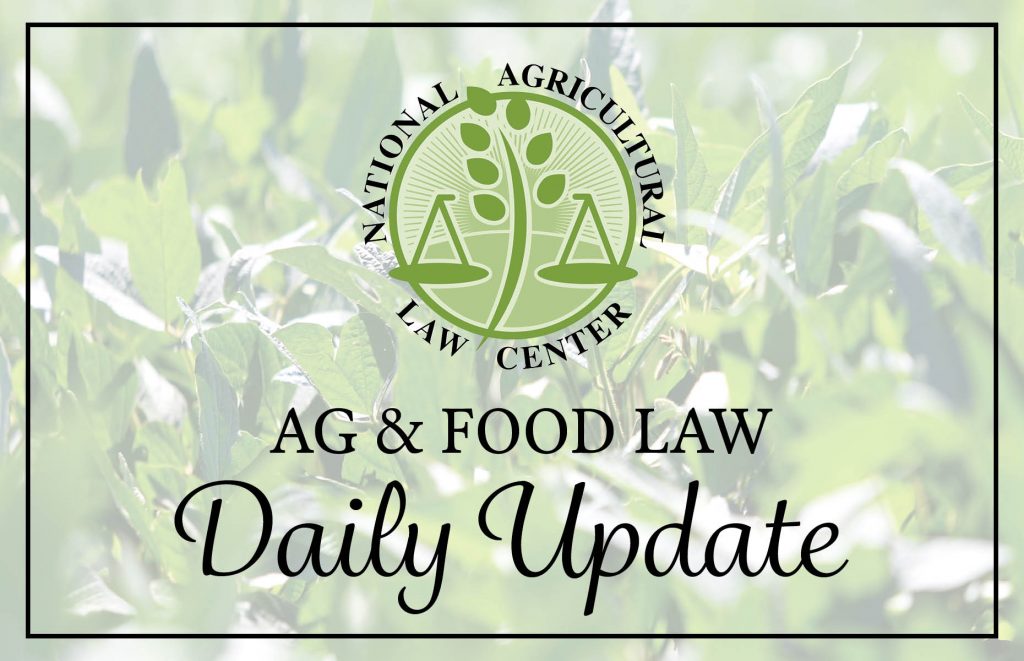A comprehensive summary of today’s judicial, legislative, and regulatory developments in agriculture and food. Email important additions HERE.
JUDICIAL: CAFOs, CWA, RCRA
In Garrison v. New Fashion Pork LLP, No. 18-CV-3073-CJW-MAR, 2020 WL 1494063 (N.D. Iowa Mar. 27, 2020) the plaintiff has brought suit against the defendant for alleged violations of the Resource Conservation and Recovery Act (“RCRA”) and the Clean Water Act (“CWA”). The defendants own and operate a large agricultural network in Iowa, including a confined animal feeding operation (“CAFO”) that contains the defendant’s hogs. The defendants use manure produced by the hogs to fertilize farmland on which they plant crops. The plaintiff is an individual who owns property adjacent to the defendant, and claims that the defendants have misapplied hog manure to their fields, causing runoff onto the plaintiff’s property. According to the plaintiff, the defendants’ alleged misapplications of manure have violated both RCRA and the CWA. The defendants have moved for summary judgment of both claims, arguing that the plaintiff’s RCRA claim must fail because the manure at issue is not “solid waste” which it must be for the plaintiff’s RCRA claim to be valid. Additionally, the defendants argue that the court should grant summary judgment on the plaintiff’s CWA claim because the defendants have entered into an Administrative Consent Order with the Iowa Department of Natural Resources (“DNR”) which included an administrative penalty and an order for the defendants to develop a standard procedure for applying manure. The defendants argue that this order prevents the plaintiff’s CWA claim.
A court will only grant summary judgment if there is no genuine issue of material fact so that the case can be decided only on matters of law. Here, the court considered whether there was a genuine issue of material fact as to any current and ongoing violations of RCRA and the CWA and concluded that the plaintiff had not presented any evidence showing that the defendants’ violations are current and ongoing. Accordingly, the court granted the defendants’ motion for summary judgment on the RCRA and CWA claims because the plaintiff could not bring those claims if the alleged violations were not current and ongoing.
REGULATORY: Includes FWS, NOAA, RHS, USDA
FISH AND WILDLIFE SERVICE
Proposed rule to withdraw the proposed rule to designate critical habitat for the Bi-State distinct population segment of greater sage-grouse (Centrocercus urophasianus) in California and Nevada as threatened under the Endangered Species Act. Info here.
NATIONAL OCEANIC AND ATMOSPHERIC ADMINISTRATION
Final rule approving Framework Adjustment 32 to the Atlantic Sea Scallop Fishery Management Plan. Info here.
Proposed rule withdrawing a proposal to implement Fisheries Finance Program financing of the cost of constructing new fishing vessels. Info here.
RURAL HOUSING SERVICE
Notification the Rural-Business Cooperative Service, Rural Housing Service, and Rural Utilities Service agencies of the Rural Development will temporarily allow lenders with guaranteed loans with the Agency to unilaterally offer payment deferrals. Info here.
UNITED STATES DEPARTMENT OF AGRICULTURE
Proposed rule implementing a recommendation from the Walla Walla Sweet Onion Marketing Committee to increase the assessment rate established for the 2020 and subsequent fiscal periods. Info here.
LEGISLATIVE: Includes Indiana
INDIANA
HB 1309 revises references to federal regulations relating to variances from water quality standards. Provides that a variance from a water quality standard issued for a period of more than five years must be reevaluated in accordance with the requirements of the federal rule on variances from water quality standards. Info here.
